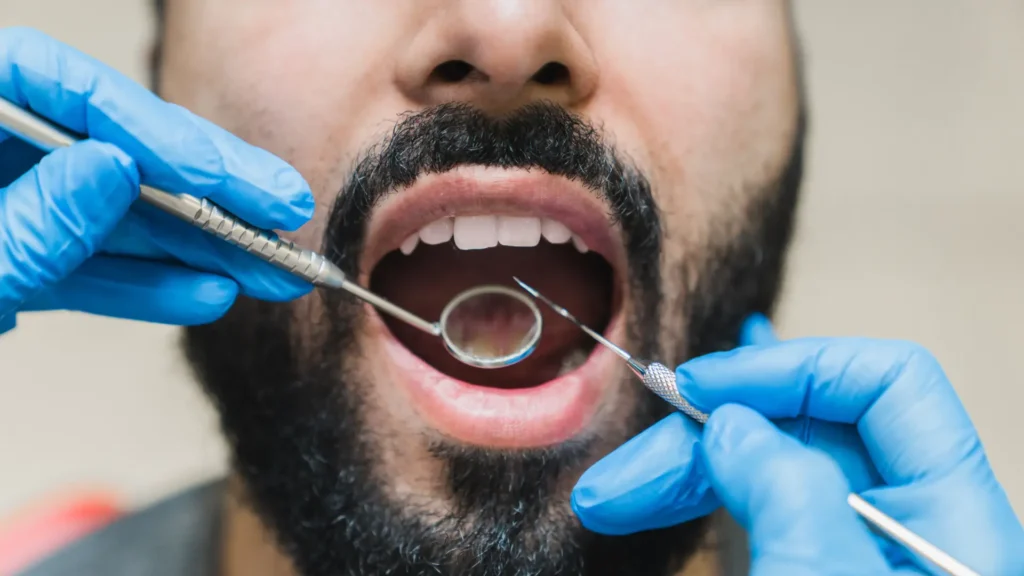Differences between a dentist and an endodontist?
An endodontist is a dentist who has finished an additional two years of postdoctoral training focused on the root canal and uses specialised instruments and techniques.
A major reason for this difference in surgical skills is the size of the tooth or root that will be removed. A dental procedure typically only involves the surface, but as an endodontic specialist, they remove more than the surface of the tooth. This requires finding the canals that lead to vital nerve tissue, in order to perform a thorough cleaning process. This creates quite a bit more pressure, and patients with sensitive gums tend to feel more discomfort after surgery than if they went through a traditional dental procedure instead.

Why do I need to see an endodontist?
If you have a tooth that’s throbbing in pain and is sensitive to hot or cold, you likely need a root canal. While many dentists offer this procedure, it’s highly recommended that you go see an endodontist for the best chances at complete healing with the least possibility of recurrence.
A dental pulp infection or tooth trauma can cause a variety of problems.
- Tooth sensitivity when we consume hot food and cold foods.
- Swelling in the soft tissue around your teeth or cheekbone area that may be painful to touch – also known as “tissue swelling.”
- Pain while chewing on crunchy items like bread crusts.
Treatments an endodontist can perform
Endodontics is the branch of dentistry that treats diseased pulp tissue. It takes place in two phases, diagnosis and treatment.

What is a root canal?
Root canal (endo) treatments are a common dental procedure that can be used to repair a tooth that is badly damaged or infected by bacteria. Endodontists also deal with various filling materials to replace root canals. The term “root canal” consists of removing all pulpal tissue surrounding a diseased tooth’s pulp chamber, lower its apex through a hole drilled into its crown region, then fill it with gutta-percha points and seal it off.
Symptoms: Do I need a root canal?
When you notice any of these signs, you should make an appointment at your dentist right away!
- Firstly, an abscess. It’s a pocket of pus somewhere below the gum line that may be causing swelling and pain in nearby teeth as well.
- If your tooth feels tender or sensitive when you eat anything cold. These are signs of decay below the tooth surface that is damaging nerve endings (more common on teeth with large cavities).
- Headaches. If it hurts to bite down or open your mouth wide for a while, these are all signs that root exposure might be causing infection and inflammation around nerves in your upper jaw.
- You have a persistent toothache or you’re sensitive to hot or cold food or beverages.
- You have noticed a dry socket.
- There has been a sudden onset of pain, especially after chewing particularly tough foods.
- You have had the symptoms for more than a few days, yet no relief from ibuprofen.

The procedure of a root canal
A root canal treatment typically begins when a dentist removes the nerve of a tooth (nerve removal) and fills the hole from there. Then, they can proceed with an “endodontic” filling to seal that hole. If everything goes according to plan and if the endodontic filling was successful, then you’ll live without pain for many years following your procedure! First, your dentist will numb the tooth, gum tissue, face and both jaws (maxillary) or just numb the mouth area (periapical); then, they will carefully clean out bacteria from inside the root canal system.
What are the benefits of having a root canal procedure done?
- Healthier teeth (including fewer cavities)
- To keep your natural teeth and thus, avoid false teeth or extractions. False teeth are extremely expensive, and extractions will necessitate extracting the tooth as well as replacing it with a dental bridge or implant – often both!
- Your symptoms will be relieved within hours-days. The time varies depending on the severity of the problem.
Is there anything I can do to prevent tooth decay or avoid needing a root canal?
There are many things that can be done to minimise the risk of getting tooth decay or needing a root canal.
- Brush teeth twice per day, preferably with fluoridated toothpaste and rinse for at least one minute each time. Floss once per day (preferably after brushing).
- Drink 8 oz of water every hour while awake. Avoid beverages other than water if possible.
- Limit sugar intake by bringing healthier options like fruits, vegetables, and grains into your entire diet, not just for dessert purposes – this practice can reduce sugars eaten in one sitting from 30g to 15g! Avoid soft drinks and fruit juices because they have added sugars too.
So, you have some questions about endodontics? We’ve got the answers! If you are experiencing any of the symptoms we mentioned above, call your dentist or go to a dental clinic right away. If you have any questions or if you want to know more about the benefits of having a root canal procedure done by an endodontist, please let us know in the comments below. We’ll be happy to answer your question and provide even more information on this topic.

